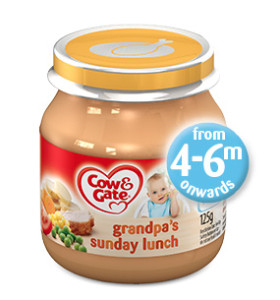Baby food regulations: 6-months recommendation and less sugar
Members of the European Parliament (MEPs) voted on 19 January 2016 (393 votes in favour, 305 votes against) to reject draft EU rules on baby food, which would have allowed baby foods to contain high levels of sugar and products to be labelled for use from 4 months of age. The European Commission (the EU’s civil service) now has to bring its new Delegated Act into line with the sugar recommendations from the World Health Organisation and the World Health Assembly’s requirement that baby foods are not marketed for use before 6 months of age and resubmit them.
 Once this is done, Danone will no longer be able to market producrts such as “grandpa’s Sunday lunch” for babies of four months of age. Babies require nothing other than breastmilk or infant formula for the first 6 months of life. They are also more likely to develop a better relationship with food if they associate tastes and textures with the look and feel of solid food.
Once this is done, Danone will no longer be able to market producrts such as “grandpa’s Sunday lunch” for babies of four months of age. Babies require nothing other than breastmilk or infant formula for the first 6 months of life. They are also more likely to develop a better relationship with food if they associate tastes and textures with the look and feel of solid food.
Companies market foods for use from too early an age as babies of four months are not ready for solid foods and parents are perhaps more likely to buy processed foods than prepare purés themselves. Sales Director of Cow and Gate/Milupa, Ian Thomas, explained to the marketing press in 1997 how the company wants products to be displayed in retail outlets:
“We suggest milk is merchandised on the left hand side of the fixture, followed closely by an early weaning block – jars and packet foods from 4 months – to stop mums drifting into home-made foods.”
Formula regulations: improvements do not go far enough
Baby Milk Action won some improvements to the new Delegated Acts for formulas during consultations, persuading the Commission to introduce new specific wording requiring all exports from the EU to be understandable and 3 extra paragraphs: about the International Code, risks of advertising and links to concerns about obesity. These changes should help Member States take the necessary action at national level.
We also got the language toughened up to make it clearer that infant formula branding and package text, images and colours should be clearly distinct from those used on follow-on formula and Formulas for Special Medical Purposes.
Our supporters asked MEPs on the Environment, Public Health and Food Safety Committee to support motions by Keith Taylor MEP to improve all the Delegated Acts further, but only the baby food motion received sufficient votes to go to the full Parliament.
Update 20 July 2016: the overarching EU Regulations came into force today. See our analysis of how they are being implemented in the UK – and the possible impact of Brexit.
Danone formula exported in bulk to China in breach of EU labelling laws
Danone claims it has to ration sales of formula to customers in Europe because stocks are being bought up and shipped out to China (as in Boots).
Such exports are illegal if the products are not labelled in the correct language for the country of sale. It is strange, therefore, that Danone did not support Baby Milk Action’s successful call for this requirement to continue in the Commission’s new Delegated Acts. Why not?
 An IBFAN investigation has shown Danone formula from Europe is on sale in China – though not individual units bought in supermarkets, but bulk packages of formula such as Nutrilon.
An IBFAN investigation has shown Danone formula from Europe is on sale in China – though not individual units bought in supermarkets, but bulk packages of formula such as Nutrilon.
This posting (left) on the Alibaba.com business to business website by a company based in Ningbo, Zhejiang Province, China, gives a minimum order quantity of 600 units. The labels are in Dutch so the export Directive has been broken.
While individuals do send formula overseas in breach of the language requirement, no other companies ration their formula. Danone’s use of rationing due to supposed high demand has been criticised as a way to draw attention to its products.
Danone makes formula for 180 countries at its factory in Ireland. Any supply restrictions in Europe are because Danone is prioritising countries where it wants to grow the market.
